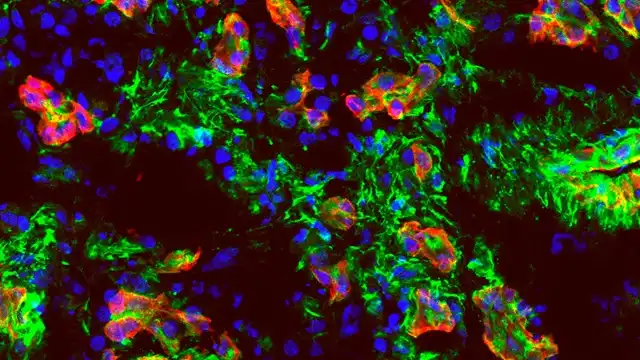Pancreatic Cancer Triggers Immune Response Contradicting Previous Views
- Normal Liver Cells Found to Promote Cancer Metastasis to the Liver
- Nearly 80% Complete Remission: Breakthrough in ADC Anti-Tumor Treatment
- Vaccination Against Common Diseases May Prevent Dementia!
- New Alzheimer’s Disease (AD) Diagnosis and Staging Criteria
- Breakthrough in Alzheimer’s Disease: New Nasal Spray Halts Cognitive Decline by Targeting Toxic Protein
- Can the Tap Water at the Paris Olympics be Drunk Directly?
Researchers Discover Pancreatic Cancer Triggers Immune Response Contradicting Previous Views
- Should China be held legally responsible for the US’s $18 trillion COVID losses?
- CT Radiation Exposure Linked to Blood Cancer in Children and Adolescents
- FDA has mandated a top-level black box warning for all marketed CAR-T therapies
- Can people with high blood pressure eat peanuts?
- What is the difference between dopamine and dobutamine?
- How long can the patient live after heart stent surgery?
Researchers Discover Pancreatic Cancer Triggers Immune Response Contradicting Previous Views
The latest findings from Cold Spring Harbor Laboratory (CSHL) shed new light on pancreatic cancer, challenging previous beliefs.
Researchers found that pancreatic cancer can trigger an immune response, contradicting the earlier notion that pancreatic cancer suppresses the immune system.
Their study focused on pancreatic ductal adenocarcinoma (PDAC) and revealed consistent antibody responses in patients, offering a new avenue for treatment development.

As a postdoctoral researcher in Professor Douglas Fearon’s lab at CSHL, Min Yao investigated pancreatic cancer cells (pictured in red in the image above) to better understand their interaction with the immune system. Fearon emphasized that without the generous support of the Simons Foundation, this foundational research would not have been possible. Image source: Fearon Lab/Cold Spring Harbor Laboratory
Over 90% of pancreatic cancer cases are attributed to a highly invasive and deadly disease known as pancreatic ductal adenocarcinoma (PDAC). Little is known about how our immune system interacts with PDAC, making developing treatment strategies challenging. It was previously believed that patients would not exhibit a natural immune response to cancer because the tumor environment somehow prevented such a reaction. Many doubted that PDAC would interact with the immune system at all.
CSHL scientists have now confirmed that pancreatic cancer does indeed trigger a response from our immune system. However, T cells, which typically help fight off most diseases, struggle to infiltrate PDAC tumors. These findings could guide future efforts in developing treatment methods.
In this study, CSHL Professor Douglas Fearon collaborated with a team, including lead author Min Yao, Professor Matthew Weiss from the Zucker School of Medicine, and Sophia Shen, a participant in the CSHL Partners for the Future program from Cold Spring Harbor High School. They initially set out to identify a new antigen unique to PDAC tumors and not present in normal tissues. The body produces cells called antibodies that can recognize specific antigens and help destroy them. Identifying new PDAC antigens could help explain why some patients have better outcomes than others.
Unexpected Discoveries and Implications
The research team sequenced plasma cells from pancreatic tumor samples of seven Northwell Health patients. They then synthesized antibodies based on this sequence. The idea was that the synthetic antibodies would guide the team in finding new PDAC antigens behind the human immune response. Instead, they did not find the targeted objects but discovered 25 antibodies reacting to antigens produced by cancer cells and normal cells consistently across patients.
“I was surprised by the clarity of the data; we have many antibodies reacting to the same antigens from multiple patients,” Fearon said.
Previously, researchers believed that pancreatic cancer would suppress the immune system, with some exploring vaccines as a potential solution. According to Fearon and his team’s findings, such a strategy may not be necessary.
“Pancreatic cancer is not silent in immunology. That’s the message,” Fearon explained. “Pancreatic tumors are already immunogenic. We face the challenge of harnessing the immune response to attack cancer.”
Now that scientists have a better understanding of the issue, they can attempt to develop viable solutions. This represents a true step forward and a welcomed development in the world of pancreatic cancer research.
Researchers Discover Pancreatic Cancer Triggers Immune Response Contradicting Previous Views
(source:internet, reference only)
Disclaimer of medicaltrend.org
Important Note: The information provided is for informational purposes only and should not be considered as medical advice.



